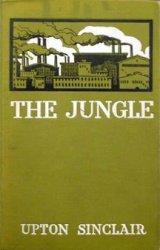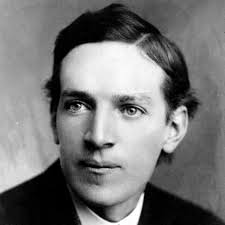The Jungle Page #33
The Jungle is a 1906 novel by the American journalist and novelist Upton Sinclair. Sinclair wrote the novel to portray the harsh conditions and exploited lives of immigrants in the United States in Chicago and similar industrialized cities.
And there were things even stranger than this, according to the gossip of the men. The packers had secret mains, through which they stole billions of gallons of the city's water. The newspapers had been full of this scandal--once there had even been an investigation, and an actual uncovering of the pipes; but nobody had been punished, and the thing went right on. And then there was the condemned meat industry, with its endless horrors. The people of Chicago saw the government inspectors in Packingtown, and they all took that to mean that they were protected from diseased meat; they did not understand that these hundred and sixty-three inspectors had been appointed at the request of the packers, and that they were paid by the United States government to certify that all the diseased meat was kept in the state. They had no authority beyond that; for the inspection of meat to be sold in the city and state the whole force in Packingtown consisted of three henchmen of the local political machine!* (*Rules and Regulations for the Inspection of Livestock and Their Products. United States Department of Agriculture, Bureau of Animal Industries, Order No. 125:-- Section 1. Proprietors of slaughterhouses, canning, salting, packing, or rendering establishments engaged in the slaughtering of cattle, sheep, or swine, or the packing of any of their products, the carcasses or products of which are to become subjects of interstate or foreign commerce, shall make application to the Secretary of Agriculture for inspection of said animals and their products.... Section 15. Such rejected or condemned animals shall at once be removed by the owners from the pens containing animals which have been inspected and found to be free from disease and fit for human food, and shall be disposed of in accordance with the laws, ordinances, and regulations of the state and municipality in which said rejected or condemned animals are located.... Section 25. A microscopic examination for trichinae shall be made of all swine products exported to countries requiring such examination. No microscopic examination will be made of hogs slaughtered for interstate trade, but this examination shall be confined to those intended for the export trade.) And shortly afterward one of these, a physician, made the discovery that the carcasses of steers which had been condemned as tubercular by the government inspectors, and which therefore contained ptomaines, which are deadly poisons, were left upon an open platform and carted away to be sold in the city; and so he insisted that these carcasses be treated with an injection of kerosene--and was ordered to resign the same week! So indignant were the packers that they went farther, and compelled the mayor to abolish the whole bureau of inspection; so that since then there has not been even a pretense of any interference with the graft. There was said to be two thousand dollars a week hush money from the tubercular steers alone; and as much again from the hogs which had died of cholera on the trains, and which you might see any day being loaded into boxcars and hauled away to a place called Globe, in Indiana, where they made a fancy grade of lard. Jurgis heard of these things little by little, in the gossip of those who were obliged to perpetrate them. It seemed as if every time you met a person from a new department, you heard of new swindles and new crimes. There was, for instance, a Lithuanian who was a cattle butcher for the plant where Marija had worked, which killed meat for canning only; and to hear this man describe the animals which came to his place would have been worthwhile for a Dante or a Zola. It seemed that they must have agencies all over the country, to hunt out old and crippled and diseased cattle to be canned. There were cattle which had been fed on “whisky-malt,” the refuse of the breweries, and had become what the men called “steerly”--which means covered with boils. It was a nasty job killing these, for when you plunged your knife into them they would burst and splash foul-smelling stuff into your face; and when a man's sleeves were smeared with blood, and his hands steeped in it, how was he ever to wipe his face, or to clear his eyes so that he could see? It was stuff such as this that made the “embalmed beef” that had killed several times as many United States soldiers as all the bullets of the Spaniards; only the army beef, besides, was not fresh canned, it was old stuff that had been lying for years in the cellars. Then one Sunday evening, Jurgis sat puffing his pipe by the kitchen stove, and talking with an old fellow whom Jonas had introduced, and who worked in the canning rooms at Durham's; and so Jurgis learned a few things about the great and only Durham canned goods, which had become a national institution. They were regular alchemists at Durham's; they advertised a mushroom-catsup, and the men who made it did not know what a mushroom looked like. They advertised “potted chicken,”--and it was like the boardinghouse soup of the comic papers, through which a chicken had walked with rubbers on. Perhaps they had a secret process for making chickens chemically--who knows? said Jurgis' friend; the things that went into the mixture were tripe, and the fat of pork, and beef suet, and hearts of beef, and finally the waste ends of veal, when they had any. They put these up in several grades, and sold them at several prices; but the contents of the cans all came out of the same hopper. And then there was “potted game” and “potted grouse,” “potted ham,” and “deviled ham”--de-vyled, as the men called it. “De-vyled” ham was made out of the waste ends of smoked beef that were too small to be sliced by the machines; and also tripe, dyed with chemicals so that it would not show white; and trimmings of hams and corned beef; and potatoes, skins and all; and finally the hard cartilaginous gullets of beef, after the tongues had been cut out. All this ingenious mixture was ground up and flavored with spices to make it taste like something. Anybody who could invent a new imitation had been sure of a fortune from old Durham, said Jurgis' informant; but it was hard to think of anything new in a place where so many sharp wits had been at work for so long; where men welcomed tuberculosis in the cattle they were feeding, because it made them fatten more quickly; and where they bought up all the old rancid butter left over in the grocery stores of a continent, and “oxidized” it by a forced-air process, to take away the odor, rechurned it with skim milk, and sold it in bricks in the cities! Up to a year or two ago it had been the custom to kill horses in the yards--ostensibly for fertilizer; but after long agitation the newspapers had been able to make the public realize that the horses were being canned. Now it was against the law to kill horses in Packingtown, and the law was really complied with--for the present, at any rate. Any day, however, one might see sharp-horned and shaggy-haired creatures running with the sheep and yet what a job you would have to get the public to believe that a good part of what it buys for lamb and mutton is really goat's flesh!
Translation
Translate and read this book in other languages:
Select another language:
- - Select -
- 简体中文 (Chinese - Simplified)
- 繁體中文 (Chinese - Traditional)
- Español (Spanish)
- Esperanto (Esperanto)
- 日本語 (Japanese)
- Português (Portuguese)
- Deutsch (German)
- العربية (Arabic)
- Français (French)
- Русский (Russian)
- ಕನ್ನಡ (Kannada)
- 한국어 (Korean)
- עברית (Hebrew)
- Gaeilge (Irish)
- Українська (Ukrainian)
- اردو (Urdu)
- Magyar (Hungarian)
- मानक हिन्दी (Hindi)
- Indonesia (Indonesian)
- Italiano (Italian)
- தமிழ் (Tamil)
- Türkçe (Turkish)
- తెలుగు (Telugu)
- ภาษาไทย (Thai)
- Tiếng Việt (Vietnamese)
- Čeština (Czech)
- Polski (Polish)
- Bahasa Indonesia (Indonesian)
- Românește (Romanian)
- Nederlands (Dutch)
- Ελληνικά (Greek)
- Latinum (Latin)
- Svenska (Swedish)
- Dansk (Danish)
- Suomi (Finnish)
- فارسی (Persian)
- ייִדיש (Yiddish)
- հայերեն (Armenian)
- Norsk (Norwegian)
- English (English)
Citation
Use the citation below to add this book to your bibliography:
Style:MLAChicagoAPA
"The Jungle Books." Literature.com. STANDS4 LLC, 2025. Web. 10 Mar. 2025. <https://www.literature.com/book/the_jungle_272>.








Discuss this The Jungle book with the community:
Report Comment
We're doing our best to make sure our content is useful, accurate and safe.
If by any chance you spot an inappropriate comment while navigating through our website please use this form to let us know, and we'll take care of it shortly.
Attachment
You need to be logged in to favorite.
Log In